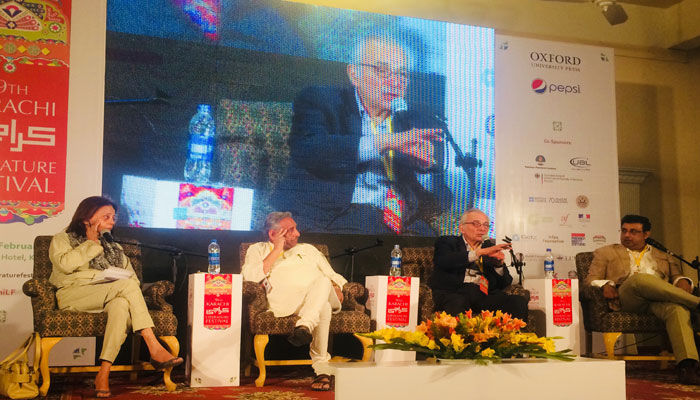'Love Thy Neighbor': India-Pak in discourse at KLF '18.
The session, titled ‘Love Thy Neighbor: India-Pak Relations’ featured a dignified panel that demonstrated a peaceful narrative from representatives of both conflicting countries and debated the swelling subject of political polarization.
The third and final day of the ninth annual Karachi Literature Festival (KLF) saw the focal point positioned around the conciliatory relations with Pakistan’s neighboring country of India and the repercussion of partition on either sides of the border.
The session, titled ‘Love Thy Neighbor: India-Pak Relations’ featured a dignified panel that demonstrated a peaceful narrative from representatives of both conflicting countries and debated the swelling subject of political polarization.
The exceptionally celebrated panel included Indian diplomat turned politician Mani Shankar Aiyar, Pakistani politician Ashraf Jehangir Qazi and notable economist and researcher Asad Sayeed with conspicuous activist and scholar, Khalida Ghaus as the moderator of the session.
The discussion on bilateralism took off with Ghaus inquisitorial of the progress that was still far from sight to which Shankar retorted that progress is only inevitable with uninterruptable dialogues. He further added that he is “half happy and half sad that this sentence has been accepted as Pakistani policy but has not been accepted as Indian policy.”
Former Pakistani ambassador to the United States, Ashraf Jehangir Qazi countering a question posed by Ghaus on his former statements of Pakistan not retaining a long term strategy on the issue of Kashmir, said: “Pakistan has had 70 years of short term policy and short term policies do not add up to a long term policy.”
In his fuming and compelling dialogue, Ghazi stated about the estimated tremendously high population rates of the country in 2050 and absence of strategies to face the adversities that’ll rise to the surface as a consequence.
Political economist Asad Sayeed speaking on trade, stated that “South Asian countries trade with each other the least than any other region in the world and that is mainly because of India and Pakistan not trading with each other.”
The talk concluded with writer and filmmaker Javed Jabbar, raising a point from the audience stating Pakistan firmly believes in unconditional dialogue and it is India that creates conditions which make dialogue impossible.
Mani Shankar responded to the attack saying, “I’m in favor of unconditional dialogue but not on the grounds that Javed Jabbar has just raised.”
The profound discussion came to a quiet end with the jam packed room observing a minute of silence in remembrance of Asma Jahangir.
The news of advocate and human rights activist Asma Jahangir’s death had broken earlier amid session and had turned the hush of the crowd into gasps of astonishment and alarm with whispers of prayers said for the deceased. The panelists had also rested their discussion fleetingly, in respect for Jahangir’s death.
-
Security forces gun down 30 terrorists in multiple IBOs in KP: ISPR
-
MQM-P calls for new province in Sindh
-
US report validates Pakistan military edge over India: PM
-
Banned TTP poses serious threat to Pakistan security: UNSC panel
-
CM Afridi clarifies remarks on by-poll after ECP requests army deployment
-
Dubai sees 3.2m Pakistani passengers in 2025 as airport sets new milestone
-
Security forces kill 23 Indian proxy terrorists in KP's Kurram
-
Pakistan to construct island to boost oil exploration: report












